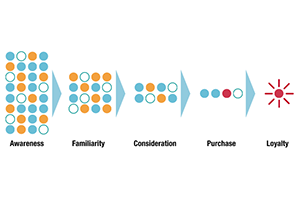Research from McKinsey & Company indicates that consistency is key to customer satisfaction. It's not enough to get each individual interaction "right" - brands have to get it "right" consistently throughout the customer journey.
Classic purchase funnel models generally start with 'awareness' and end at 'purchase.' McKinsey goes a step further, and includes 'loyalty.'
McKinsey found that consistency throughout the customer journey is an important predictor of overall customer satisfaction and loyalty.
The firm surveyed 27,000 American consumers across 14 different industries and found that measuring customer satisfaction through the customer journey is more 30 percent more predictive, overall, of customer satisfaction.
Further, improving customer satisfaction throughout the journey can lift revenue by up to 15 percent while lowering the cost of serving customers by as much as 20 percent.
McKinsey's report breaks it down to three types of 'consistency':
- Customer-journey consistency
- Emotional consistency
- Communication consistency
Brands need to build trust with customers to make, and keep, an emotional connection, and a big part of that is delivering on promises. As with personal relationships, broken promises degrade trust.
To do that, companies need to create teams that look at interactions across the entire customer journey and ensure that, throughout, promises made are promises kept, and that the company delivers on the overall brand promise, not just transactional promises.
Companies should also start by fixing areas where negative customer experiences are most common - one negative experience has a far greater impact, four to five times, than a single positive experience.
Finally, McKinsey says that brands need to address this now. Customers are less patient than ever, and competitors are always working to make it easier to switch.
As the number of touchpoints with customers increases - particularly through mobile phones and the myriad modes of communication enabled by smartphones - consistency of experience is more critical than ever.

